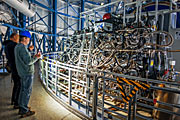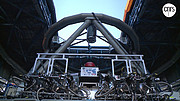Anuncio
MUSE: Nuevo film gratuito presenta la Máquina de Tiempo Cósmica de ESO.
11 de Mayo de 2017
CNRS Images, en colaboración con ESO, ha producido un documental basado en MUSE, el Multi Unit Spectroscopic Explorer. Dirigido por Christophe Gombert y Claude Delhaye, MUSE, La Máquina de Tiempo Cósmica nos muestra en detalle uno de los últimos instrumentos de segunda generación y, de hecho, el de mayor tamaño, instalados en Yepun (UT4), la cuarta Unidad de Telescopio del Very Large Telescope de ESO en el Observatorio Paranal de Chile.
El documental de 35 minutos explora la inspiración y la historia detrás de MUSE, el porqué fue necesario y cómo se llevó a cabo su construcción a lo largo de una fase de desarrollo de nueve años. Este además destaca la cooperación internacional europea requerida para llevar a cabo el proyecto, así como la participación de muchos de los cientos de investigadores, técnicos e ingenieros involucrados en su creación. También se presentan en el film la innovadora tecnología de MUSE y la ciencia de vanguardia que se realiza gracias a su empleo, todo esto entrelazado con un apasionante relato del delicado proceso de instalación que culminó con la primera luz del instrumento.
MUSE, un novedoso espectrógrafo de campo integral de última generación, es uno de los proyectos astronómicos más ambiciosos de nuestro tiempo. Su primera luz tuvo lugar en enero de 2014 (eso1407), y por medio del uso de 24 espectrógrafos 3D, obtiene espectros de amplias áreas del cielo en un gran rango de longitudes de onda, desde la luz azul hasta el infrarrojo. Cada uno de los 24 "cubos" de datos producidos por MUSE en una sola observación contiene tanta información que los investigadores requieren de meses para analizar por completo su contenido y publicar sus resultados.
A través de instrumentos con tecnología de primera línea como MUSE, ESO continúa a la vanguardia de la investigación astronómica. Desde su concepción, los astrónomos han podido estudiar el Universo de forma mucho más detallada. De hecho, no existe ningún otro instrumento disponible en la actualidad que sea más adecuado para la observación de las galaxias más tenues del Universo muy lejano, y sin duda producirá resultados de una calidad excepcional en las próximas décadas.
El proyecto cinematográfico fue dirigido por Roland Bacon, investigador principal del proyecto MUSE, y estrenado en Francia el 9 de marzo de 2017 en el Museo de las Confluencias. Actualmente, la película se ha hecho pública bajo una licencia Creative Commons No Derivada, a través del archivo de video de ESO. Puede acceder al film en este enlace.
Enlaces
- MUSE, The Cosmic Time Machine
- The MUSE blog
- MUSE instrument page
- Images made with MUSE
- Images of the MUSE instrument
Contactos
Roland Bacon
Lyon Centre for Astrophysics Research (CRAL)
France
Tel: +33 478 86 85 59
Cell: +33 608 09 14 27
Email: roland.bacon@univ-lyon1.fr
Lars Lindberg Christensen
Head of ESO ePOD
Garching bei München, Germany
Tel: +49 89 3200 6761
Cell: +49 173 3872 621
Email: lars@eso.org
Sobre el anuncio
| Identificador: | ann17025 |
Our use of Cookies
We use cookies that are essential for accessing our websites and using our services. We also use cookies to analyse, measure and improve our websites’ performance, to enable content sharing via social media and to display media content hosted on third-party platforms.
ESO Cookies Policy
The European Organisation for Astronomical Research in the Southern Hemisphere (ESO) is the pre-eminent intergovernmental science and technology organisation in astronomy. It carries out an ambitious programme focused on the design, construction and operation of powerful ground-based observing facilities for astronomy.
This Cookies Policy is intended to provide clarity by outlining the cookies used on the ESO public websites, their functions, the options you have for controlling them, and the ways you can contact us for additional details.
What are cookies?
Cookies are small pieces of data stored on your device by websites you visit. They serve various purposes, such as remembering login credentials and preferences and enhance your browsing experience.
Categories of cookies we use
Essential cookies (always active): These cookies are strictly necessary for the proper functioning of our website. Without these cookies, the website cannot operate correctly, and certain services, such as logging in or accessing secure areas, may not be available; because they are essential for the website’s operation, they cannot be disabled.
Functional Cookies: These cookies enhance your browsing experience by enabling additional features and personalization, such as remembering your preferences and settings. While not strictly necessary for the website to function, they improve usability and convenience; these cookies are only placed if you provide your consent.
Analytics cookies: These cookies collect information about how visitors interact with our website, such as which pages are visited most often and how users navigate the site. This data helps us improve website performance, optimize content, and enhance the user experience; these cookies are only placed if you provide your consent. We use the following analytics cookies.
Matomo Cookies:
This website uses Matomo (formerly Piwik), an open source software which enables the statistical analysis of website visits. Matomo uses cookies (text files) which are saved on your computer and which allow us to analyze how you use our website. The website user information generated by the cookies will only be saved on the servers of our IT Department. We use this information to analyze www.eso.org visits and to prepare reports on website activities. These data will not be disclosed to third parties.
On behalf of ESO, Matomo will use this information for the purpose of evaluating your use of the website, compiling reports on website activity and providing other services relating to website activity and internet usage.
Matomo cookies settings:
Additional Third-party cookies on ESO websites: some of our pages display content from external providers, e.g. YouTube.
Such third-party services are outside of ESO control and may, at any time, change their terms of service, use of cookies, etc.
YouTube: Some videos on the ESO website are embedded from ESO’s official YouTube channel. We have enabled YouTube’s privacy-enhanced mode, meaning that no cookies are set unless the user actively clicks on the video to play it. Additionally, in this mode, YouTube does not store any personally identifiable cookie data for embedded video playbacks. For more details, please refer to YouTube’s embedding videos information page.
Cookies can also be classified based on the following elements.
Regarding the domain, there are:
- First-party cookies, set by the website you are currently visiting. They are stored by the same domain that you are browsing and are used to enhance your experience on that site;
- Third-party cookies, set by a domain other than the one you are currently visiting.
As for their duration, cookies can be:
- Browser-session cookies, which are deleted when the user closes the browser;
- Stored cookies, which stay on the user's device for a predetermined period of time.
How to manage cookies
Cookie settings: You can modify your cookie choices for the ESO webpages at any time by clicking on the link Cookie settings at the bottom of any page.
In your browser: If you wish to delete cookies or instruct your browser to delete or block cookies by default, please visit the help pages of your browser:
Please be aware that if you delete or decline cookies, certain functionalities of our website may be not be available and your browsing experience may be affected.
You can set most browsers to prevent any cookies being placed on your device, but you may then have to manually adjust some preferences every time you visit a site/page. And some services and functionalities may not work properly at all (e.g. profile logging-in, shop check out).
Updates to the ESO Cookies Policy
The ESO Cookies Policy may be subject to future updates, which will be made available on this page.
Additional information
For any queries related to cookies, please contact: pdprATesoDOTorg.
As ESO public webpages are managed by our Department of Communication, your questions will be dealt with the support of the said Department.


